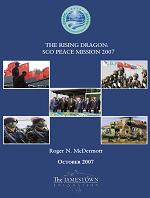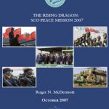“The Rising Dragon: SCO Peace Mission 2007”
By:

*Click Here to View PDF
EXECUTIVE SUMMARY
• The Shanghai Cooperation Organization (SCO) held historic counterterrorist exercises in China and Russia that lasted from August 9-17, 2007. The exercises involved military forces primarily from China and Russia, though other SCO member states (Kazakhstan, Kyrgyzstan, Tajikistan and Uzbekistan) also sent smaller units to serve as participants and observers. Peace Mission 2007 attracted tremendous interest within Central Asia and beyond, arousing premature speculation that the SCO intends to use such exercises as a basis for a military bloc to compete with NATO or to minimize Western security influence in Central Asia. Political leaders in the SCO member states reinforced the message that the SCO poses no threat to a third party and is only interested in combating the threats posed by terrorism, separatism and
extremism.
• Peace Mission 2007 must be understood in the context of the SCO’s evolving military and security dimension, which its official statements claim to be calibrated towards combating terrorism. There is little evidence that the SCO is moving closer to becoming a military bloc, but its antiterrorist exercises are sending signals to the West: It can legitimately and effectively deal with the new threats facing Central Asia. Such a message is intended to convince the governments in Central Asia to rely less on security assistance and influence from the U.S. and its allies in NATO in the future.
• Russia, increasingly militarily assertive—as reflected in its official statements and the anti-Western rhetoric from the Kremlin—seeks to use its influence within the SCO to undermine Western security projects, which Moscow believes bypass Russia’s traditional security interests in the region. Russia spent approximately $5 million on Peace Mission 2005 and increased this dramatically to around $78 million in funding Peace Mission 2007.
• Senior military planners in Moscow, including Colonel-General Yuriy Baluyevskiy, Chief of the General Staff, interpreted Peace Mission 2007 as providing practice for future SCO counterterrorist operations. He even claimed that Western-inspired initiatives to promote democracy in Central Asia, pose a potential security threat in the region.
• The scenario for Peace Mission 2007 was based on the events in Andijan, Uzbekistan in May 2005, suggesting that future SCO operations may in fact be used for quashing rebellion, or dealing with political instability. In any case, this factor in the planning of the exercises further underscores the need to reassess the events in Andijan and understand why SCO military planning staffs regard those events so seriously.
• China is keen to play a greater role in the security of Central Asia through the SCO. As the SCO develops its security credentials, other regional multilateral bodies such as the Collective Security Treaty Organization (CSTO) will become more interested in entering into a cooperative dialogue with the SCO. Beijing is concerned about terrorism within its Xinjiang Province, and wants closer cooperation to minimize any possible growth in this threat. Among the various cooperative initiatives that Beijing has been pushing for, joint military exercises are a priority for China’s military planners.
• Peace Mission 2007 was particularly notable for the PLA because it was the first time that entire PLA organizational units had taken part in a joint counterterrorism military exercise outside of China. The logistical capabilities of the PLA were also tested since supplies and support for its combat forces had to be provided over long distances.
• Central Asian militaries are keen to learn from their stronger counterparts in Russia and China. As well as benefiting from such exercises and sharing expertise and experience, Central Asian military participation was primarily supportive. Personnel from Russia and China carried out the main combat tasks during Peace Mission 2007, suggesting that in future SCO counterterrorist operations, the real work would be carried out using forces from the two senior partners in the SCO.
• Even as Chinese arms permeate the armed forces of the Central Asian states, and the frequency of their interaction with China increases, the Chinese language remains a significant challenge for further cooperation among the SCO member states. There remains a shortage of Chinese translators and teachers in several of these states, where the de facto language continues to be Russian.
• Terrorism will remain the principal threat facing the SCO members for the foreseeable future, and as such, will demand closer intelligence cooperation among its members. This is happening already through the SCO Regional Antiterrorist Structure (RATS) in Tashkent, as well as through bilateral intelligence sharing among SCO members. This area may prove more fruitful in the long run, as part of the SCO’s security cooperation against terrorism.





